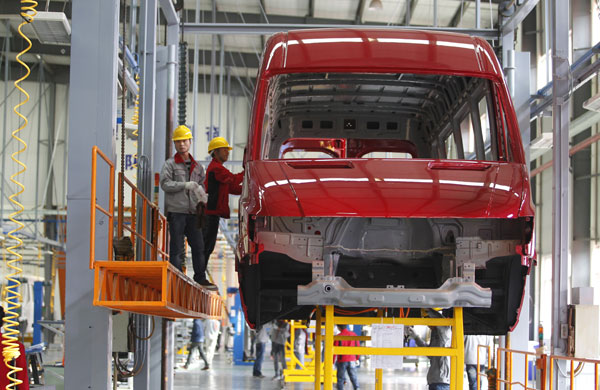Subsidies for new energy cars to be cut again
By Li Fusheng | China Daily | Updated: 2018-01-18 06:55

Subsidies for new energy cars will be cut further this year before being phased out in China altogether by the end of 2020, a source close to the matter said on Wednesday. The move would accelerate the exit of uncompetitive players from the fast-growing sector.
"The move was scheduled to be released by the end of 2017, but there was some controversy and hence has been delayed for a while," said Wu Zhixin, vice-president of the China Automotive Technology & Research Center, which participated in drafting the plan.
"The ministries concerned, including the Ministry of Finance and the Ministry of Industry and Information Technology, have reached a consensus on the final draft and submitted it for final approval, so I believe it will be released soon," he told China Daily during a new energy car forum held in Liuzhou, the Guangxi Zhuang autonomous region.
Wu did not give details about how much the current subsidies would be cut but said cars qualified for subsidies in 2017 would have their eligibility extended for around four months into this year.
A rumored version said passenger cars with a range between 100 km and 150 km, which now enjoy a subsidy of 20,000 yuan ($3,026), will no longer be subsidized in 2018, the Economic Observer newspaper had reported late last year.
China has been offering financial incentives since 2010 to stimulate the popularity of new energy cars. Bloomberg reported that the subsidies had cost the Chinese government 59 billion yuan by 2015, and it may need to set aside 83 billion yuan more for 2016 and 2017.
Wu said subsidy cuts will see small and uncompetitive players wiped out faster than expected but outstanding performers would not be affected much.
"Good selling brands have good bargains from suppliers, and some are raising the prices of their cars a little bit, but the customers still love them."
Ron Zheng, a Shanghai-based partner with consultancy firm Roland Berger, expects new energy car sales to grow at a decent pace this year.
"Carmakers have expected a gradual cut in subsidies, the buyers will see a higher price, but it will not have a big impact because most of them live in large cities where gasoline car license plates are hard to obtain."
The China Association of Automobile Manufacturers estimated that new energy car sales would grow at around 40 percent to exceed 1 million units in 2018. More than 777,000 units were sold last year in China, a 53 percent surge year-on-year.
























